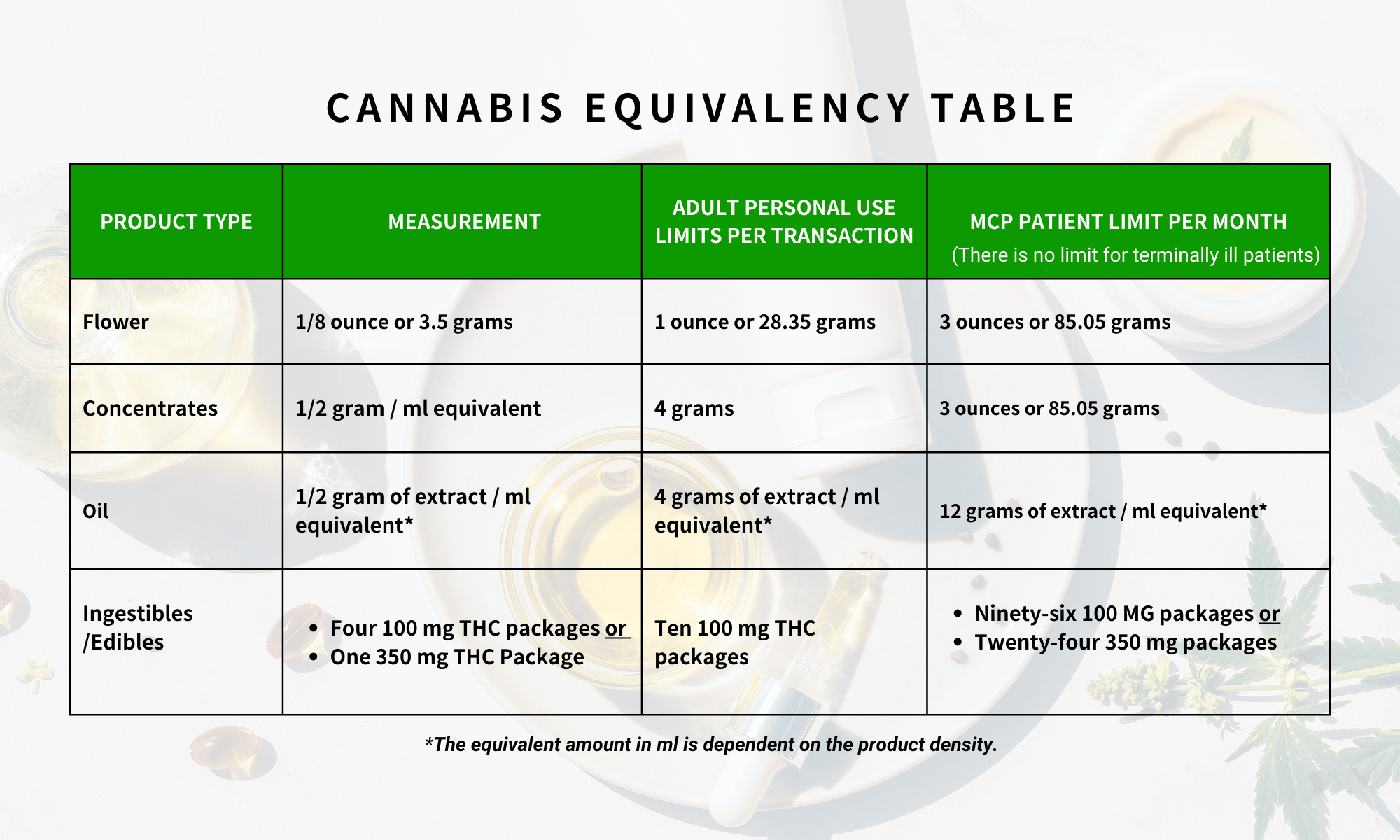Yes. Adults 21 years and older can buy recreational cannabis at a licensed dispensary. Adults and minors with a qualifying medical condition may participate in the Medicinal Cannabis Program.
Patients and adult-use consumers may purchase cannabis and cannabis products at one of New Jersey's licensed dispensaries. Note some locations dispense medicinal cannabis and medicinal cannabis products only. Purchasing cannabis from anywhere other than these locations is illegal and the safety of the purchased product cannot be guaranteed.
In each transaction, dispensaries are allowed to sell up to the equivalent of 28.35 grams or 1 ounce of usable cannabis. That means up to:
- 28.35 grams (1 ounce) of dried flower, or
- 4 grams of solid cannabis concentrates or resin, or the equivalant of 4 grams of concentrate in liquid form (solution in milliliters), or
- 4 grams of vaporized formulations (oil), or
- 1000 mg of multiple ingestible cannabis-infused products (10 100 mg packages) like gummies
A purchase of a combination of products may be 14.17 grams (1/2 ounce) of dried flower and 2 grams of concentrate, or 5 packages of gummies and 14.17 grams (1/2 ounce) of dried flower.

Legally allowable product categories include dried flower, concentrated oils, resin, vape formulas, tinctures, topicals, syringes, lozenges, soft chews, and shelf-stable food products but availability will vary by dispensary.
New Jersey state law allows adults 21 years and older to have up to 6 oz of cannabis and cannabis products in their possession.
Retail sales of cannabis and cannabis products are subject to New Jersey sales tax of 6.625%.
No. The price of cannabis in both the medicinal and recreational cannabis market is set by the cannabis business that sells the products.
No. Current New Jersey law does not give authority to NJ-CRC to authorize private, residential, or any growing of cannabis outside of a business with a cultivation license.
Generally, an adult 21 years of age or older can use cannabis on private property. However, property owners can limit the use of cannabis on their property. Visit our Recreational Use and Medicinal Cannabis pages for more information about buying and using recreational cannabis in New Jersey.
Both terms refer to the plant of genus Cannabis L. The terms “cannabis” and “marijuana” have traditionally been used interchangeably. However, pursuant to the November 2020 election, Article IV, section VII, paragraph 12 of the New Jersey State Constitution creates a legal distinction between “cannabis” and “marijuana.” In short, “cannabis” refers to the regulated form of the plant (what will be grown, bought, and sold in licensed stores), whereas “marijuana” refers to the unregulated form of the plant (what is grown, bought, and sold in the illicit market).
Hemp and cannabis both derive from the Cannabis plant. The difference is determined in the amount of tetrahydrocannabinol (THC) found in the particular item. THC is the psychoactive compound of the plant that contributes to feeling “high.” Items with a THC concentration of not more than 0.3 percent are considered hemp, and items with a THC concentration < 0.3% have more psychoactive compounds and may be referred to as cannabis, marijuana, or another related name.
Hemp production was legalized in the federal 2018 Farm Bill. The New Jersey Department of Agriculture is responsible for regulating hemp production in New Jersey. Visit the Department of Agriculture’s website for more information.
Cannabidiol (CBD) is a compound found in the cannabis plant. It is typically found in hemp flower or derived from hemp plants as an oil and used for medicinal or therapeutic purposes. It is different from THC in that CBD does not contribute to feeling “high.”
As a derivative of hemp under the federal 2018 Farm Bill, CBD products fall under the regulatory authority of the U.S. Food and Drug Administration (FDA) and are subject to the Federal Food, Drug and Cosmetic Act. Whether individuals can legally sell CBD products depends on the intended use of the product and how it’s labeled, among other things. Visit the FDA’s website for more information.
Yes. The State Agriculture Development Committee (SADC) considers cannabis an agricultural crop and that growing cannabis on a preserved farm is permitted under the deed of easement. The growing of cannabis on a preserved farm, whether grown outdoors and/or indoors, must still comply with applicable CRC regulations and DOE provisions, including soil protection and applicable stormwater requirements, and post-preservation utility easements would need to be reviewed in advance by the SADC for consistency with the Department of Energy (DOE).
Under the CREAMM Act, the Social Equity Excise Fee (SEEF) is collected from cannabis cultivators when they sell or transfer products to any other license class. The SEEF rate may be adjusted annually by the New Jersey Cannabis Regulatory Commission. The 2024 SEEF rate is $1.24 per ounce. On December 12, 2024, the NJ-CRC Board voted to impose a SEEF rate of $2.50 per ounce for both usable and unusable cannabis used for the purposes of manufacturing for 2025.
Under the CREAMM Act, revenue collected from adult-use cannabis sales—through taxes, fees, and penalties—is deposited into the Cannabis Regulatory, Enforcement Assistance, and Marketplace Modernization (CREAMM) Fund. These funds are appropriated annually by the New Jersey Legislature to support the operations of the New Jersey Cannabis Regulatory Commission (NJ-CRC). It also:
- Grants, loans, and assistance programs for communities disproportionately harmed by past marijuana laws
- Programs that promote education, health, and economic opportunity
All appropriations of revenue from cannabis sales (both for the CREAMM and SEEF Funds) are made by the Governor and the Legislature.
 Official Site of The State of New Jersey
Official Site of The State of New Jersey